Back to the current year |
|
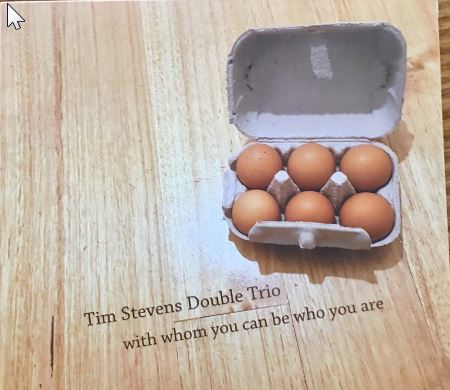 | Tim Stevens Double Trio - with whom you can be who you are (Rufus RF148)
|
The arrival of a new recording from pianist /composer Tim Stevens is always an exciting event.Stevens isn't just a performer/composer, but a deep-thinker as well. He holds degrees in Music Performance ands undertook doctoral research on Melbourne’s Red Onion Jazz Band in 2000 graduating with the Doctorate of Philosophy from the Melbourne Conservatorium. With some of his original compositions he first recorded two CDs, King, Dude and Dunce (Newmarket, 1995) and Sudden in a Shaft of Sunlight (ABC Jazz, 1998) both of which are iconic Australian jazz albums.Despite his incredible performing capacity and résumé, Steven’s gifts have largely flown under the awards radar. This new recording has the potential to change that. The improvising trio meets the classical trio of strings and collaboration is the way forward to great things with the entire ensemble joining together supporting the piano melodies sumptuously and stylishly. The elements that shine through mostly are Steven’s accomplished compositional ability and his commitment to integrity in performance. Tracks like m.k., a through-composed structure , m.i. and the sixteen minute m.b. (alternating variations) present serene and sometimes sprightly textures utilising harmonic contours from the strings, with the piano trio supporting floating melodies. These compositions are a tour de force standout, with complexity and energy in each passing bar, the trios exchanging movements, while lines become balanced indirect melodies, before handing the baton off to the piano, bass (Marty Holoubek) and drums (Tony Floyd). All of Tim Steven’s past work has been thoughtfully rendered and artistically significant, but this recording of exceptional quality may just be his masterpiece and one that moves him closer to the jazz pantheon
    
|
Barry O'Sullivan
|
| Back to Index |
|
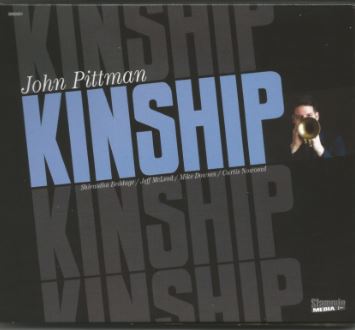 | John Pittman - Kinship (Slammin Media SMO001)
|
If I was to point to an Australian trumpeter whom I could compare John Pittman, it would be Todd Hardy. John Pittman is a Toronto based trumpeter, composer and educator and this is his first album as a leader however he has recorded with the New Orleans influenced The Heavyweights Brass Band. All but two of these eight pieces were penned by Pittman at various stages of his relatively short career since being named the 2007 Schirmer Prize Winner at the prestigious Eastman School of Music. Pittman is one of those rare talents who has command of various styles both from the perspective of his playing and composing and Kinship clearly is reflective of that. The opener ‘Ties that Bind’ is reminiscent of early 1960’s Miles when Tony Williams drove the dynamic forces. ‘For Siobhan’ has a heavy backbeat courtesy of drummer Curtis Nowosad but its contemporary credentials are cleverly counter-balanced by a fiery solo from Pittman and a Mike Downes bass solo that tells a compelling story of his high end articulation and imagination. ‘Homio-stasis’ has that Chet Baker/Gerry Mulligan flavour courtesy of Shirantha Beddage’s baritone and an egalitarian arrangement. Stevie Wonder’s ‘As’ has a sweaty New Orleans second line funky aura, overlayed by Pittman’s fat tone and white hot solo. The most innovative piece is the Black Eyed Peas hit ‘Where is the Love’. Once again Pittman’s arrangement masterfully counter-balances free flowing improvisation with the sweet popcorn of Justin Timberlake’s irresistible melody and a swinging passage from pianist Jeff McLeod
   
|
Frank Presley
|
| Back to Index |
|
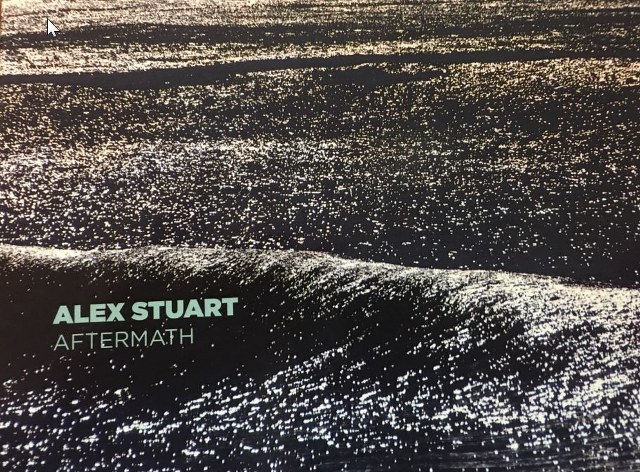 | Alex Stuart - Aftermath (Jazz Family JF037)
|
Virtuoso guitarist Alex Stuart’s music is influenced by modern jazz, indie music from the Dirty Projectors, the avant-garde of Björk and rock music from Grizzly Bear. After relocating to Paris in 2005 Stuart recorded three albums, won the jury prize at the Jazz à Juan International Jazz Festival and was nominated for the Freedman Jazz Fellowship back in Australia. His latest recording enlists the talent of a stellar band featuring Irving Acao on saxophone and keyboards, Arno de Casanove on trumpet voice and keyboards, Ouriel Ellert on bass, Antoine Banville on drums and Nicolas Dri on organ, Fender Rhodes and the not often heard Guitaret. Their splendid musicianship complements Stuart’s uniquely recognisable guitar to perfection resulting in a masterclass in how to build drama, tension and harmonic heaven with six musicians and no discernible or noticeable overdubs. Favourite tracks The Invisible Force and An Afternoon With Kiefer are haunting semi-rock ballads with de Casanove’s voice and trumpet adding atmosphere and depth to the composition. There’s not a dud moment during the entire fifty-two minute playing time resulting in some really great tunes with infectious beats and rhythms from Ellert and Banville and concise solos especially from de Casanove on trumpet and Acao on saxophone. With lots of call and response and counterpoint in the arrangements and an atmosphere of passion and joie de vivre with respect for tradition throughout, combined with a future-facing vibe, what more could one ask for? This is a superb recording from which fans of contemporary improvisation will derive much audio pleasure
    
|
Barry O'Sullivan
|
| Back to Index |
|
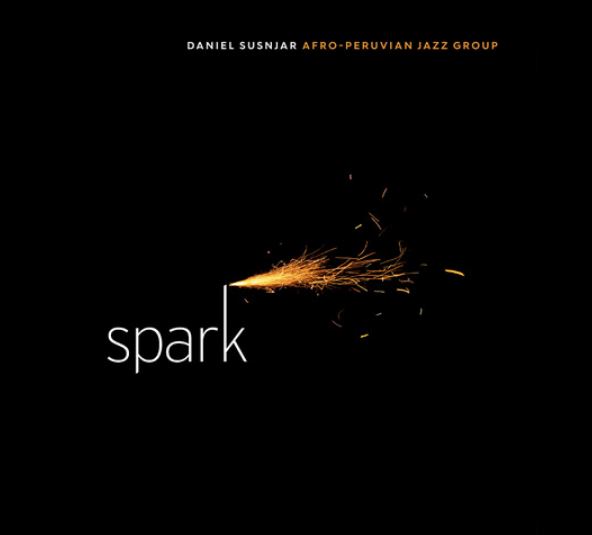 | Daniel Susnjar Afro Peruvian Group - Spark (DSUS 0003)
|
The Daniel Susnjar Afro-Peruvian Jazz Group is an award-winning seven piece ensemble that plays original compositions influenced by Afro-Peruvian rhythms and fresh, unique arrangements of traditional Peruvian folk songs. Founded in Miami in 2011 and driven by Susnjar's extensive touring and research in Peru, USA and the Caribbean, culminating in a Doctoral drumming dissertation, the ensemble has continually pushed forward with innovative ways to express artistic sensibilities from the Afro-Peruvian and jazz musical traditions.Following on from their previous albums, Su Su Nje and Moth to a Flame, their third album showcases the ensemble performing live to an in-studio audience on original
compositions reflecting important themes found in Peruvian culture including family, hope, resilience and the celebration of life. This is an album that straddles jazz and Afro - Peruvian beat in an elegant push and pull that sometimes edges close to the former, sometimes wanders closer to the latter and often sits joyfully in the middle. The hybrid tone of the band is hugely important to the mix, with the Afro - Peruvian beat of Susnjar’s drumming balanced by the more classical jazz texture of Harry Mitchell’s piano, Jeremy Thomson’s guitar licks and the horns of Ricki Mallet (trumpet) and Luke Minness (saxophone). Susnjar is the unequivocal star of Spark wallowing in the wonderful freedom of rhythmic expression. His unique drumming style rarely resorts to repetition as it alternately responds to and drives changes in the music. The result is a percussive masterclass. What saves Spark from being an album uniquely for drum nerds is Susnjar’s songwriting skills which make the complex sound effortless, creating something intricate and expansive, but never contrived or academic. Rarely has percussive innovation sounded this downright satisfying
    
|
Barry O'Sullivan
|
| Back to Index |
|
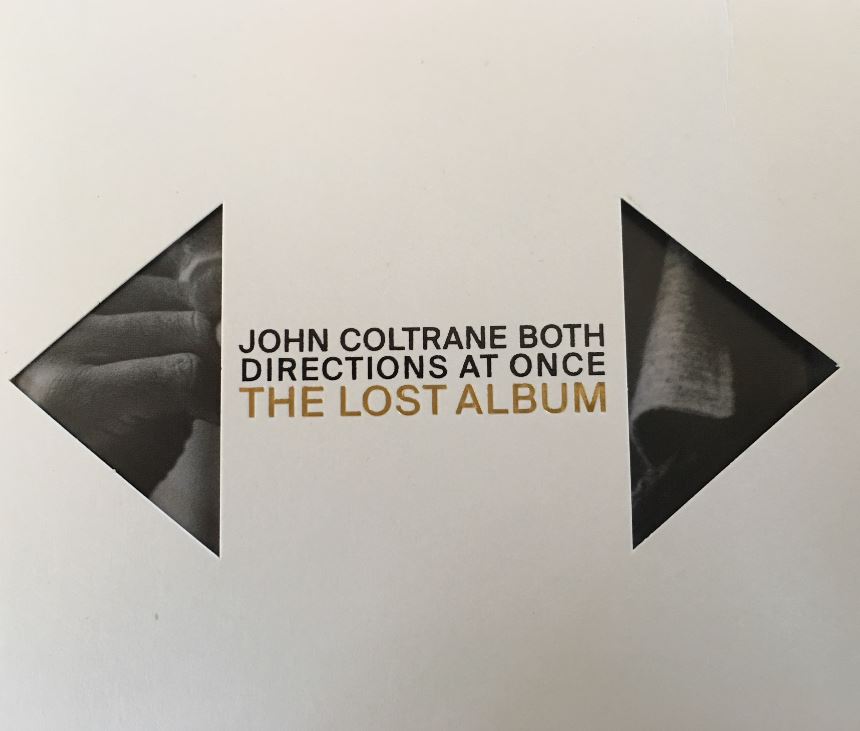 | John Coltrane and his Band - Both directions at once: The lost album (Impulse 49299)
|
As the legendary saxophonist Sonny Rollins so rightly put it, ‘This is like finding a new room in the Great Pyramid’. The musical implications of this album, the original compositions, the arrangements, the band, 1963 the year it was recorded, all amount to a rediscovery and re-contextualization of one of the most important jazz musicians of our time
On this album, there are two completely unknown and never-heard-before originals played on soprano sax: Untitled original 11383 and Untitled original 11386. 11383 features an arco bass solo by Jimmy Garrison, a relative rarity, and 11386 marks a significant structural change for the quartet, in that the players keep returning to the theme between solos. In addition One up one down (released previously only on a bootleg recording from Birdland Records) is heard here as a studio recording for the first and only time. It contains a fascinating exchange between the drummer Elvin Jones and Coltrane
This studio session also yielded Coltrane’s first recording of Nature boy which he would record again in 1965. The two versions differ greatly. Intriguingly, Coltrane approaches this present version as a tight and solo-less trio with McCoy Tyner laying out. Also on the album is Vilia from Franz Lehár’s operetta The merry widow, popularised by clarinetist Artie Shaw’s big band in 1939. Coltrane approaches this composition with a light-hearted effect, first on tenor and then, more convincingly, on the soprano
Impressions, one of Coltrane’s most famous and oft-recorded compositions, is played here by the piano-less trio. It’s one of the more interesting aspects of this session and reflects the harmonic possibilities that Coltrane was known to be discussing regularly around this time with Ornette Coleman. It’s interesting to note that Coltrane only attempted this tune in the studio a few times and these rediscovered four takes, by all indications, are the last time he ever recorded the tune
As night fell on that recording session, the master tapes were shelved with other Impulse sessions. Coltrane packed his horn and left with the rest of the quartet.What happened to these recordings after that point is partly conjecture based on the habits of Coltrane and his label. We do know that they were never mixed or mastered into an album and there was no paperwork reflecting a plan to release the music. In multiple interviews the producer Van Gelder maintained that, after Coltrane’s death in July 1967, all master tapes in his possession were retrieved by Impulse and ended up in a
storage facility. In the early 1970s, as part of a general cost-cutting effort, reel after reel of precious music was discarded to reduce storage fees. These tapes survived due to another privilege that Coltrane enjoyed at Impulse. After each session he received seven-inch tape reels to take home for review. Some he shared with Naima his wife and it’s these mono audition reels, in good shape for plastic and oxide ribbon more than 55 years old, that have delivered to jazz fans historical music that would have been lost forever
This album is a major addition to the Coltrane catalogue and the most important jazz discovery in recent years
    
|
Barry O'Sullivan
|
| Back to Index |
|
 | Hashima - The Haywain (Metropolis Music Company CD074)
|
For me, Belgrade was an unlikely focal point for jazz. Brainchild of guitarist Igor Miskovic, Hashima is a Belgrade based quartet with their second album attracting serious international attention. I am using my newly minted phrase ‘horror jazz’ as a term of endearment to describe this album as a shuddering triumph. Taking inspiration from the Serbian classical composer Vasilije Mokranjac and Hieronymus Bosch’s ‘The Haywain Triptych’ (Museo del Prado), these five original pieces are a confronting work that shocks, scares then lulls you into a state of serene relief with the use of haunting moments of silence before jolting your senses into a super groove. Screaming guitar, wailing saxophone, thunderous bass and thrashing cymbals with the addition of special guest Portuguese trumpeter Susan Santos bring this music from aural temptation to theatrical ‘fright night’ using elements of Balkan folk, Pink Floyd and Croatian Punk tempered wonderfully by underscored moments of lucid jazz sensibility. Yes the arrangements make for glorious suspense but the exceptional musicianship along with enlightened production, that somehow make the soloists stand out like illuminated silhouettes in the night, all combine to elevate this album into masterpiece territory. If I had to reluctantly choose a highlight it would be ‘Ray of the Microcosm’ inspired by Bosch’s left panel where man is created, portrayed by the stark echoes of Miskovic’s single plucked strings before Todorovic’s arco bass brews up a storm when mankind falls into sin, characterised by Srdan Mijalkovic’s pensive, yet tempestuous tenor sax
    
|
Frank Presley
|
| Back to Index |
|
 | Adrean Farrugia And Joel Frahm - Blued Dharma (GB Records GBCD1804)
|
The last time I heard a saxophone/piano duo sound as good as this was the album Dave Liebman and Mike Nock released in 2007 entitled Duologue. This album sees Toronto based pianist Adrean Farrugia team up with New York tenor stalwart Joel Frahm. Like Duologue, this album also features two jazz standards, Ray Nobles well worn Cherokee and the Kern/Hammerstein Showboat classic Nobody Else but Me. In fact the musical rapor is so strong on Cherokee that two takes are included. The five other originals are provided by the pianist whose soulful writing is matched by his melodic stylings as an improviser. Both players timing is akin to two friends enjoying conversation and finishing each other’s sentence. For me there are several highlights. Farrugia’s title track Blued Dharma a great example of the simpatico between these artists. The pianist allows Frahm’s tenor to soar into cosmic territory whilst always maintaining the orderly melody. Gospell has a spiritual feel as Farrugia leads the tenor on a path of righteousness that is later reconciled back to the soulful melody line. Both takes on the favourite Cherokee find the piece cleverly and harmonically deconstructed by Farrugia complete with dissonant edges but neither interpretation loses its fundamental resemblance to Noble’s evergreen composition. Cool Beans kindles Horace Silver Blue Note memories. Farrugia with a heavy left handed bass line setting a platform for Frahm’s crisp utterances sending sparks flying back for Farrugia to launch into his own series of ascending and descending rapids over the deep undercurrent
    
|
Frank Presley
|
| Back to Index |
|
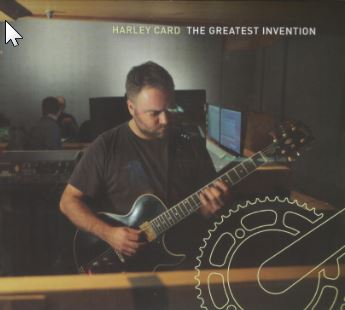 | Harley Card - The Greatest Invention (DYM 003)
|
Those of us who have enjoyed the hybrid blend of guitarist James Muller with Will Vinson’s alto will know just how effective the guitar and saxophone are as lead instruments in front of the traditional piano, bass, drums trio. In this recording Toronto guitarist Harley Card and fellow Torontonian David French (here playing tenor saxophone) form textures just as intricate in front of the trio made up of Matt Newton piano, Jon Maharaj bass and Ethan Ardelli drums
Lyrical improvisations are woven through thoughtful arrangements of quite minimalistic compositions in terms of melody. Elsewhere, periods of elegance and understated swing, poignantly punctuate what is an overall tasteful contemporary jazz guitar release worthy of repeat listening. Alternatively if you happen to be in Toronto, in an unbridled live setting, I’d imagine the repetition in some of these pieces would allow them to be ideal vehicles in a pressure cooker jam session
The title track’s inspiration comes from a book written by Ben Irvin called Einstein and the Art of Mindful Cycling. For me this is the highlight track, especially in terms of intense interactions bridged by chamber-like passages of Jon Maharaj’s arco bass. This arrangement seems to inhale and exhale generating forward momentum between piano, saxophone and guitar with the propulsion provided by the broad bass buttresses. Then Ethan Ardelli’s thunderous drum solo emerges before the invention takes shape in the form of Card’s oblique yet appealing improvisation, devoid of unnecessary razzle dazzle. Here is a talent worthy of wider recognition
   
|
Frank Presley
|
| Back to Index |
|
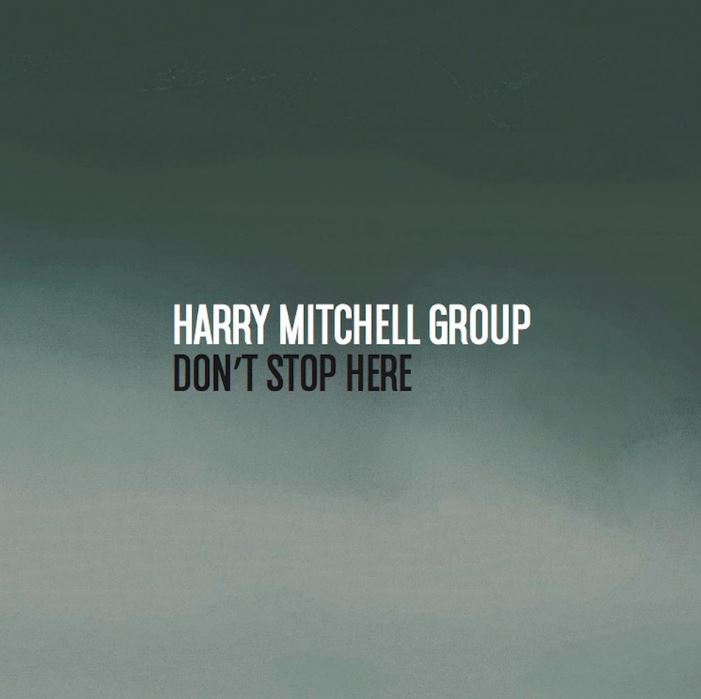 | Harry Mitchell Group - Don’t Stop Here (https://harrymitchellpianist.bandcamp.com)
|
Harry Mitchell has progressively been evolving as a pianist, composer and band leader since he was thirteen. As a follow-up to his self titled debut album on his second release he has again assembled his dream team of musicians from Perth, saxophonist Jamie Oehlers, drummer Daniel Susnjar, guitarist Jeremy Thompson and the bassist Karl Florisson all of whom have their own strong musical voices. Mitchell has a definite vision for his music, one that is tightly arranged but also leaves enough room for inspired soloing. The result is a very clean post hard bop sound that utilises tenor saxophonist Oehlers and drummer Susnjar to solid effect coupled with Mitchell’s ability to prepare and maintain a soft ground upon which the group can build its harmonic architecture. The stylish and subtle guitar underplaying of Jeremy Thompson is augmented with his impressive solos on Transit, Neurosis and Don’t Stop Here and throughout Jamie Oehler’s saxophone playing is always impressive either blowing hard or just cruising alongside of Mitchell’s deft pianoforte. Harry Mitchell is finding his voice on this outing and that voice has something worth saying and listening to
   
|
Barry O’Sullivan
|
| Back to Index |
|
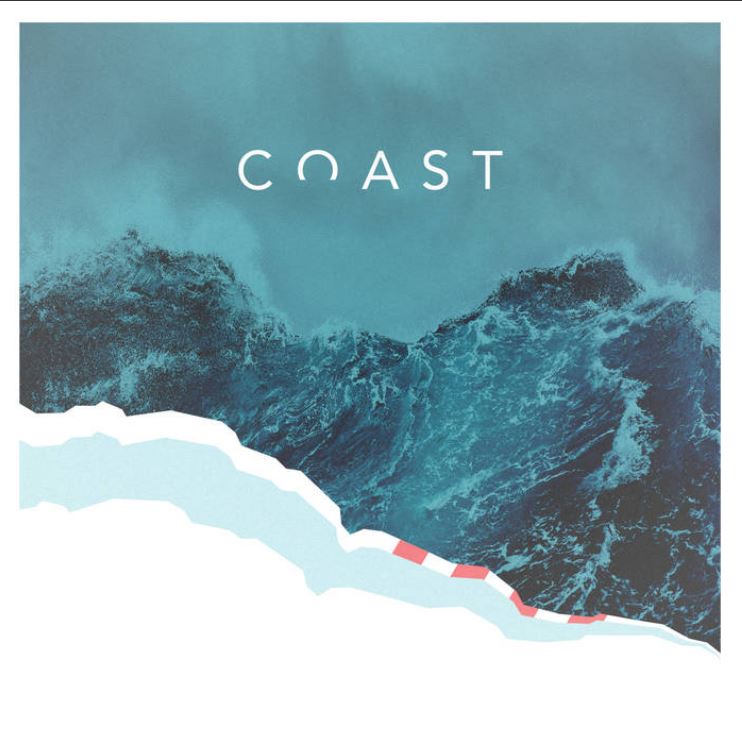 | Paul Derricott's Coast Band - Coast (AAC084)
|
The ensemble Coast was formed with the mission statement of exploring complex rhythmic structures and textures in a jazz and improvising manner.Their recently released self titled debut album is high in energy and full of dynamic instrumentals, sparkling in the variety of its timbres and the diversity of its colours. The title takes on an additional meaning in this context, because it translates the relationship that this album bears to the sound source - ie the waters of the shorelines of Australia. On the aptly titled tracks, Tide, Black Line and White Water, Peter Koopman’s guitar playing is texturally dominant but it does marry harmoniously with Michael Avgenicos’s saxophone and Shannon Stitts’ keyboard playing, deftly juxtaposing electronica, funk, jazz, and prog rock.Pulsating like some mysteriously precise metronome, one completely free of the rigidity that belongs to merely functional time, is the imprint of Paul Derricott’s drums, a true fist of iron inside this records’ velvet glove. But there's no grandstanding in this team effort. Each member, with the inspired addition of Giorgio Rojas on congas on favourite track Dance 35, equally contributes to the rhythmic and harmonic textures, thus creating an impressive panoply packed with musical bravura
    
|
Barry O’Sullivan
|
| Back to Index |
|
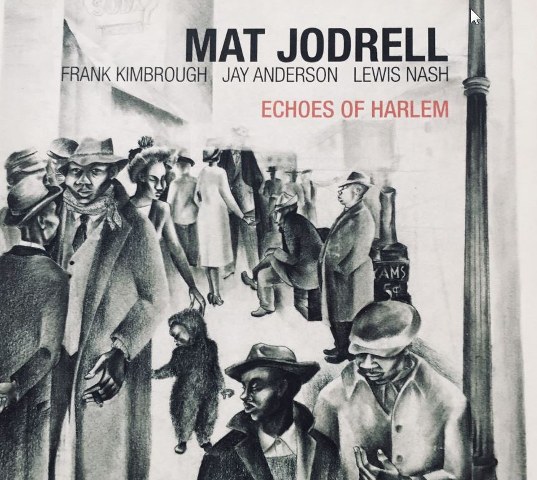 | Mat Jodrell - Echoes of Harlem (Nicholas Records, 999466)
|
Australian trumpeter and composer Mat Jodrell on his latest recording echoes the music of one of New York City's most vibrant and culturally diverse areas, Harlem. Jodrell draws on the rich heritage of Harlem’s music with the title tune composed by one of the area's most famous inhabitants, Duke Ellington, as well as performing his own original compositions. In the stellar company of three of New York’s finest jazz exponents, pianist Frank Kimbrough, bassist Jay Anderson and drummer Lewis Nash, the recording delivers an eclectic mix of the old and the new all centred around the glorious sounds that emanate from Jodrell’s trumpet and fluegelhorn. Old favourites I Gotta Right To Sing The Blues and East of The Sun are joyously recreated with flair alongside an Ennio Moricone soundtrack, the Jimmy Rowles masterpiece The Peacocks and tunes from Mulgrew Miller and Harold Mabern that allow the band to fully extend and shine. There’s some astounding drumming from Lewis Nash, and Frank Kimbrough deftly displays why he’s Jazz Orchestra leader Maria Schneider’s preferred “go to” man for piano, while throughout Jay Anderson’s bass is sensitive, warm and swinging. It’s an all-star package, beautifully mixed and mastered, aptly showcasing Jodrell’s love of the music and his amazing talent
    
|
Barry O’Sullivan
|
| Back to Index |
|
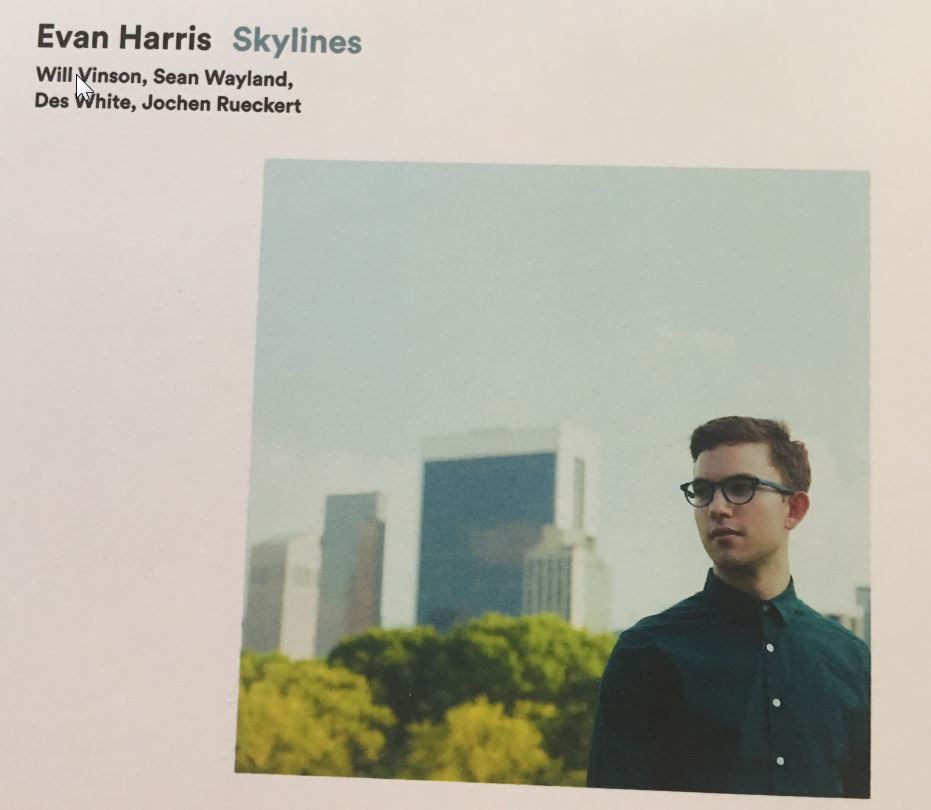 | Evan Harris - Skylines (54 Records, CD 5404)
|
This debut recording from the New York based Australian saxophonist displays his exceptional prowess as a tenor player, composer, arranger and band leader. Beautifully recorded by Mike Marciano at Systems Two Studios in Brooklyn the album glides through a palette of styles and subdued colours delivering far more than just the greys and browns encountered on initial listening. From the breezy Gunderman and Spring Song to the hard swinging Equilibrium, Harris is in the solid company of some well chosen sidemen.These include the expat Australians, pianist Sean Wayland and bassist Des White, ex London alto saxophonist Will Vinson and New York based German drummer Jochen Rueckert. Delving deeper, one discovers Harris delivering some highly imaginative playing and sparkling improvisations with clear unhurried tenor sax notes. Every player is equally relevant here and adds a personal touch leading to a unique and adventurous offering. While at times the melodies can become less memorable and can tend to blend into each other in an inconsequential way, the band's level of musicianship remains consistently high consciously constructing some beautiful dreamy soundscapes.The vignette improvisations on Skylines at Sunrise and Skylines at Sunset are perfect examples. But more importantly, what stands out is a smart and stimulating recording that bodes well for the future of its young leader
   
|
Barry O’Sullivan
|
| Back to Index |
|
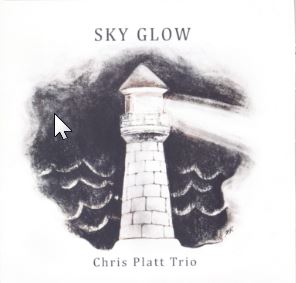 | Chris Platt Trio - Sky Glow (MAPL Independent)
|
Sky Glow is the debut release from Toronto based guitarist Chris Platt and his trio of Phill Albert bass and Robin Claxton drums. Reflective and at times intensively introspective the seven track album is a showcase for his compositional skills as much as his technical facility. Initially inspired by Hendrix, Stevie Ray Vaughan and Derek Trucks, Platt completed his degree in jazz studies at the University of Toronto with such pedigree as Mike Murley, Kelly Jefferson and Chase Sanborn. ‘No More’ is the melodic highlight of the recording. Taken at a slow strolling pace, Platt overlays a melancholy Lenny Breau ‘Canadian Country’ influenced melody over the top of his own rhythm guitar undercurrent, while Albert’s bass states the simple two note bass-line and Claxton’s brushes simmer away underneath. ‘Platter’ is a nod to his blues heroes. It punctuates alternatively with full stops and swinging gear shifts creating foot-tapping moments of up-tempo bop and in-the-pocket groove. The title track is a mellow piece with echoes of Jim Hall. Platt plays with an understanding of dynamics that belies his years. No more is this evident than on the lyrical ‘Sky Glow’ where his elegant restraint, use of space, splashes of colour and interplay with bass and drums are at the forefront. Albert takes an unhurried and harmonically thoughtful solo on bass. Homage has certainly been paid to the guitar trio lineage with this album that forms the basis of a platform for Platt to continue to develop his own style
  
|
Frank Presley
|
| Back to Index |
|
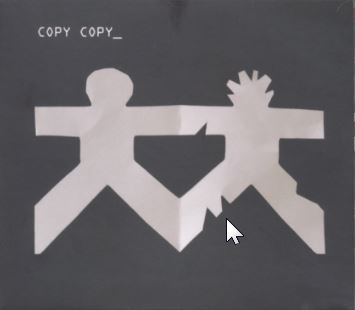 | Crump Cake Orchestra - Copy Copy (Crumpcakeorchestra.com)
|
“The Jazz Police is someone who is complaining, complaining all the time”. That spoken word from the title track appears about two minutes into this disc and acts like a red flag to the establishment. The sound of this twenty piece orchestra is a kind of 21st Century re-imagining of the Daly-Wilson Big Band who, in the 1970’s, were also entertaining on the edge of jazz. Inspired by Robert Glasper and Duke Ellington, Adelaide based orchestrator and arranger, Evan Bassani has re-arranged music by the Adelaide electro duo voiceROM. The fourteen tracks are punctuated by a number of short textural thresholds which serve to change your focus from quirky theme to musical oddity. There is plenty of funk and rhythmic drive in these mostly uptempo pieces and the dynamism of the arrangements make maximum use of the various horn sections. The solos are infrequent but satisfying while there is plenty of fun and humour especially in the spoken word and voice manipulation. The highlight is a two part piece ‘Ballad of one of the trumpet players from the Shaolin Afronauts’. The first part starts with a simple snare beat and solo trumpet stating the melody over a sustained synthesizer before the full trumpet and trombone sections join. The second part lifts the tempo and includes the whole orchestra channeling a glorious Stevie Wonder Master Blaster moment. The piece reaches its climax with Maynard Fergusonesque screaming trumpets. No wonder this orchestra was a hit at the 2012 Adelaide Fringe Festival.
   
|
Frank Presley
|
| Back to Index |
|
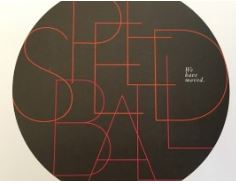 | Speedball - We Have Moved (Core Records 00135)
|
Speedball is a quintet formed in Perth seventeen years ago with a stellar
lineup. The members now mostly live in Melbourne now, thus the title.The three central voices of the recording are Carl Mackey’s saxophone,Mat Jodrell’s trumpet and the piano of Grant Windsor which are complemented by the exquisite work from drummer Daniel Susnjar and the exceptional work of Australia’s busiest bassist Sam Anning. A standout feature of the recording immediately noticeable is the wonderful sound captured which allows every instrument to be heard in a spacious almost tactile quality.The drums benefit most from this and Susnjar is an energetically lyrical master of playing them with vitality and a seemingly restless energy.Standout tracks include Cleveland Steamer and Gospel with the horns of Jodrell and Mackey. They are both players of magnitude and enormous talent sharing a twenty year history of performance, teaching and touring together, reflecting their influences from Freddie Hubbard and Woody Shaw.Pianist Grant Windsor continues to stun the world with his skills as a pianist, composer and arranger on this recording and no doubt his level of input contributes to it becoming the masterpiece it is
    
|
Barry O’Sullivan
|
| Back to Index |
|
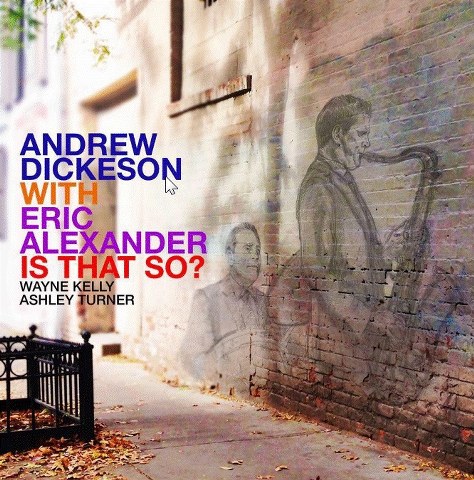 | Andrew Dickeson Quartet - Is That So (Independent)
|
This could have been an entirely different recording altogether.Dickeson had perviously conceived it as a project with the hard bop American pianist Harold Mabern in mind when he was to be touring Australia. However, circumstances brought Eric Alexander and his tenor on board instead delivering a distinct sound that doesn't overly rely on any one influence. What a bonus that proved to be with Dickeson inspirationally engaging Canberra based pianist Wayne Kelly and old mate Ashley Turner on double bass as well, with himself on drums completing a pretty tight outfit.Their playing together is stellar. Opening with the rarely heard Duke Pearson title track, they dance and cook their way through a repertoire that reinterprets classic tunes from the Great American Songbook- George Gershwin, Jimmy Van Heusen, Rodgers and Hammerstein - and the Brazilian composer Roberto Menescal concluding the session with a bluesy original from Alexander.Standout tracks include Bronislaw Kaper’s Invitation and Menescal’s Little Boat, both featuring great solos from Kelly and Alexander. An all analog, all valve, minimum signal path recording magnificently captured by engineer Phil Punch creating a sonic masterpiece of straightforward hard bop jazz.
    
|
Barry O’Sullivan
|
| Back to Index |
|
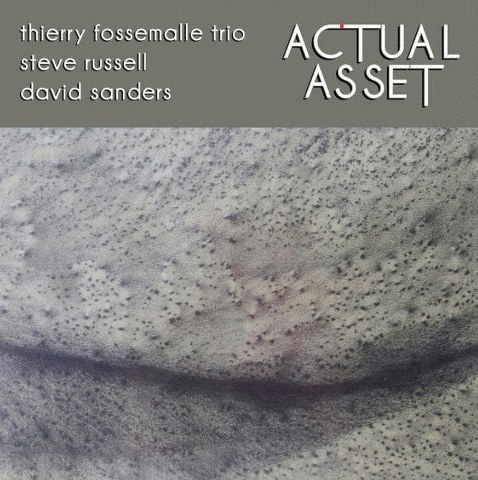 | Thierry Fossemalle Trio - Actual Asset (Independent www.thierryfossmalle.net)
|
Double bassist Thierry Fossemalle appears in his debut as a leader on an outstanding trio album showcasing his own virtuosity with the talents of Steve Russell (piano) and David Sanders(drums) . Performing all of Fossemalle’s compositions in a traditional acoustic jazz trio format, the fiery and sometimes hectic improvisations in this session album indicate that the band was ready for a convincing outing. Everything you want from a jazz trio recording is present here - electricity, pacing, innovation, and interplay - with Fossemalle offering his own personal energy in his robust right hand strumming throughout each track. His conception of time and space is uniquely compatible with the highly gifted pianist Steve Russel’s vision of the same; and there’s a certain radiant tonality to the playing of David Sanders which complements the other band members perfectly. It’s a pity Fossemalle doesn’t allow himself more opportunities on the outing to showcase his talents solo. The standout tunes, including the title track Actual Asset, Big Pam and the easier paced Simple Pleasures are mere gems in a vault of superbly played originals from a straight forward Australian trio jazz at its finest
   
|
Barry O’Sullivan
|
| Back to Index |
|
 | Justin Gray and Synthesis - New Horizons (Justingraysynthesis.com)
|
Toronto based artist Justin Gray may not be widely known to Australian audiences but some of his collaborators over the years are well known down-under. Greg Osby and Ingrid Jensen need no introduction while tenor saxophonist Tony Malaby recorded with our own, the late David Ades in Brooklyn back in 2011. Like our own cross cultural explorers Matt Keegan and Sandy Evans, the bassist and composer Justin Gray also shares a passion for the fusion of Indian classical styles with jazz. So intense is that passion, that in 2010 he co-created an instrument with a sound that seamlessly straddles both genres without compromise. As the sole practitioner of this instrument, his multi-stringed fretless bass veena coalesces the electric bass tradition of Pastorius with the humming resonance and agility of the vichitra veena. Underpinning the sophistication of the project is the addition of the Venuti String Quartet which provides a glorious, almost orchestral unison ride for Gray to state the raga and carnatic melodies against the deep grooves of drummer Derek Gray and Ed Hanley’s tabla. All these memorable melodies are from the pen of the bassist. The purity of tone of this instrument is at its crystalline best on ‘Break of Dawn’ when the strings lay off and Alam Khan joins the party on sarod but its Gray’s virtuosity which compels the listener to the rotational symmetry of the plucked drone strings, the strummed body strings and the remaining four conventional fretless bass strings. This is an outstanding debut and a must listen for indo-jazz fans
   
|
Frank Presley
|
| Back to Index |
|
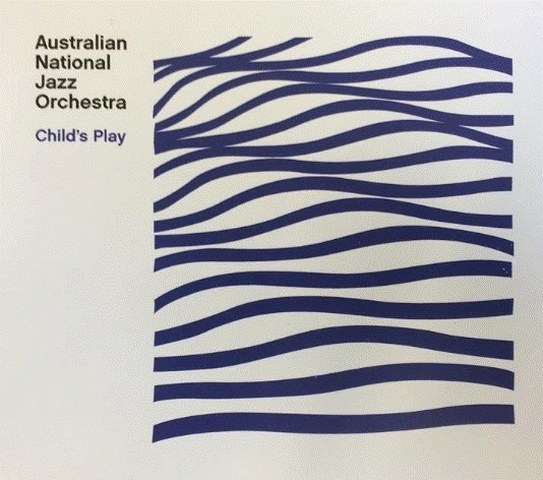 | The Australian National Jazz Orchestra - Child’s Play (54 Records, CD 5403)
|
The Australian Jazz Orchestra made its debut performance at the inaugural Sydney Conservatorium International Jazz Festival Music Workshop. Their final concert performance was recorded live and is now released on the non-profit, peer-reviewed music label 54 Records, launched in 2017 by musician /educator David Theak. It features a dazzling line-up of Australian jazz talent with cameos from Mat Jodrell on trumpet, Dave Panichi on lead trombone, James Muller on guitar, Roger Manins on tenor saxophone and Hugh Barrett on piano. Five of the six tracks are new works by the Melbourne based composer Nick Mulder, who also conducts, and the sixth is the alluring Duke Ellington composition Prelude To A Kiss. The ensemble of cutting-edge musicians is exemplary, the album's running time and recording quality more than acceptable capturing perfectly the magic of that performance which I had the enjoyment of attending. If one track was to stand out perhaps it would be A Blue Interlude with the stunning featured trumpet playing of Mat Jodrell along with the hearty tenor saxophone of Roger Manins. The title track, Child’s Play, is Muller’s turn to shine and what a star guitarist he is. All sparkle and polished technique of a world-class standard. Awesome stuff indeed! But this recording is not all about flashy solos, but more about the way that they help to shape the music, together with an extraordinary ensemble of talented players that is truly a fusion of contemporary big band music, jazz orchestra, and modern jazz
    
|
Barry O’Sullivan
|
| Back to Index |
|
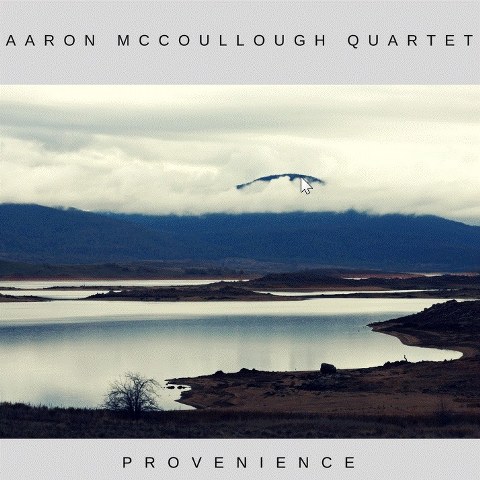 | Aaron McCoullough Quartet - Provenience (www.aaronmccoullough.com)
|
The focus of Provenience is embedded in a reflection upon and a rediscovery of specific localities of the Illawarra region in New South Wales, Australia. The tunes, written by drum master/composer Aaron McCoullough, represent his personal responses to growing up there and are named after places and localities that he has a special affinity with. Throughout all tracks the exemplary guitar playing of Hugh Stuckey is a standout as each track pursues its own distinctive path. A tune named after Bombo beach (a magical location) provides the perfect vehicle for the steadfast prowess of pianism displayed by James Bowers whose extended solo on this track is a feature of the album. McCoullough is generous with the amount of space he provides these musicians to shine in allowing them to freely stretch their improvisations alongside his technically superb drumming skills which maintain perfect tempos throughout. He is a true master of form. New York bassist Marty Holoubek engages beautifully gentle bass playing giving inconceivably cosmic atmosphere to the album. This is most notable on Mystics named after a beach in the Illawarra which is an all-time favourite with locals. From start to finish perfection reigns on this album with every number worthy of the endorsement Shortcomings? To state the case as clearly as possible, there are none. This album is a class act with some first rate musicianship
    
|
Barry O’Sullivan
|
| Back to Index |
|
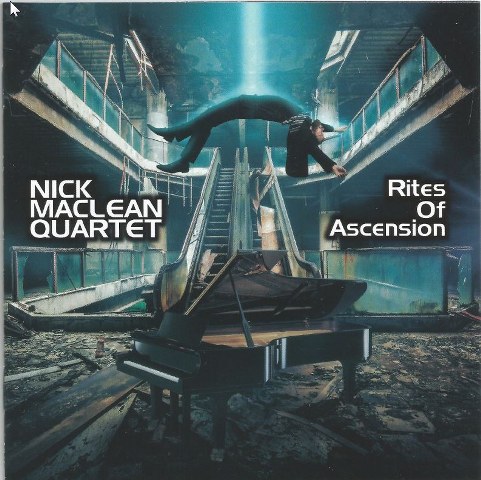 | Nick Maclean Quartet - Rites of Ascension (Browntasaurus NCC-1701K)
|
This twenty-something Toronto based pianist will be largely unknown to Australian audiences, but with albums like this along with his other project ‘Snaggle’ likened to Snarky Puppy, Maclean’s trajectory can only be upward. Raised in Ottawa, and inspired by Fats Waller and Benny Goodman records, he was later influenced heavily by Herbie Hancock’s music, and, it seems, his philosophy, which are major inspirations on this album. Personal expression and fun are the hallmarks of Nick Maclean’s music and both are in abundance here. The overly familiar ‘Cantaloupe Island’ opens the album but Maclean’s arrangement uses chromatic colours to put his stamp on the Hancock hit. Trumpeter Brownman Ali, with his crystalline tone, controlled vibrato and precise facility tips his hat to Hubbard while accelerating ‘Driftin’ into double time. ‘One Finger Snap’ then follows at a pace that requires two fingers snapping. Samples of Hancock voicing wisdom are used to colour some Maclean original’s which allow the album to ascend from a platform of the past into the music of tomorrow. The highlight is the contribution from Ali ‘Madness of Nero’ which seems to encompass all the stylistic elements of the album into one piece including samples from philosopher Christopher Hitchens. The pair open in unison over a Tyler Goertzen’s backbeat, while Maclean’s block chords are utilised heavily in solo adding to the madness. Ali’s fleeting inventions are constructed to perfection and build to climax before he again responds musically to Hitchen’s take on the madness of power. Then the funk sets up a second and final climax.
   
|
Peter Wockner
|
| Back to Index |
|
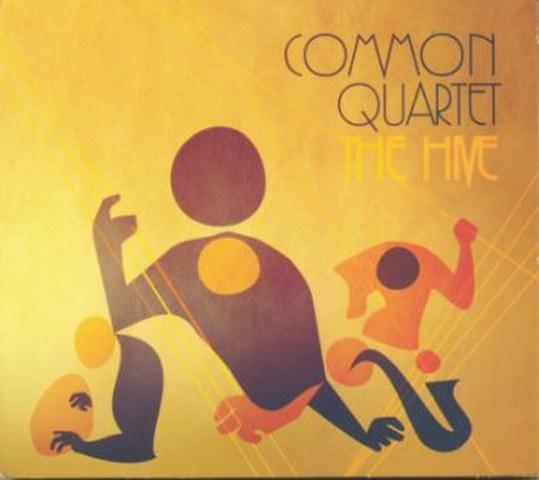 | Common Quartet - The Hive (www.commonquartet.com)
|
Like our own Sandy Evans, the saxophonist and leader of this Brooklyn based quartet Seth Trachy, is a student of Indian Classical music. His musical explorations don’t end there though. He has a fascination with the Pygmy music of Cameroon along with Afro-Peruvian music. While those influences are abiding, their imprint on this music is only subtle, for this recording is steeped in the tradition of hard-bop. Common by name but hardly by nature, CQ’s music is far from common. Each of the members (with origins from Chile, Israel, Colorado and North Carolina) contribute seven of the nine original offerings. The standards, Coltrane’s ‘Lazybird’ and Parker’s ‘Big Foot’ are ideal showcases for the saxophone led quartet. The quartet is augmented twice by ex-Paul Motian guitarist Steve Cardenas. It’s a class outing. The band plays as an ensemble, within themselves, never over-cooking but with elegant restraint and the arrangements complement this feel. Command and authority are saved for the up-tempo pieces but one gets the feeling there is always fuel left in the tank. One of the highlights is a piece from the Israeli pianist Nitzan Gavrieli entitled ‘Traffic’. The head is full of punctuation from the band before they lay off and allow Gavrieli the solo space to bring the traffic scene to life with darting, shifting, impatient horn sounds. The band re-enters with forward momentum again and Trachy’s tenor provides further musical onomatopoeia on the traffic theme. The piece peaks with Wyatt’s drum solo and equal doses of punctuation
   
|
Frank Presley
|
| Back to Index |
|
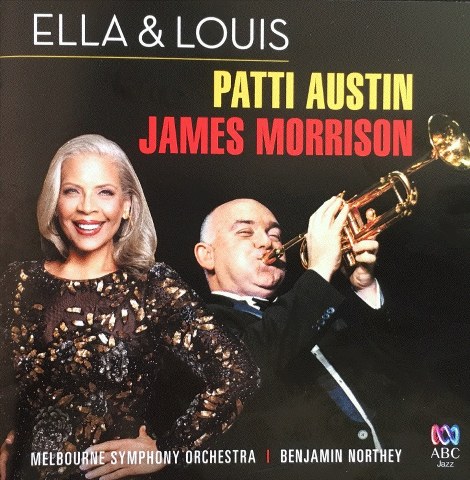 | Patti Austin and James Morrison - Ella and Louis (ABC 6483)
|
James Morrison is, by anyone’s standards, a virtuoso in the true sense of the word.Besides the trumpet, this multi-instrumentalist also plays piano, all the brass, saxophones and the double bass.He deftly displays his prowess on the trumpet and trombone on this newly released double CD with the Melbourne Symphony Orchestra and the American vocalist Patti Austin.The ensemble deliver a warm celebration of the iconic duet recordings of Ella Fitzgerald and Louis Armstrong recorded last year at The Melbourne International Jazz Festival before a live audience.Backing Morrison and Austin and the Orchestra are the outstanding performances of his band musicians, Jake Barden - saxophone,Mark Fitzgibbon - piano,William Morrison - guitar, Harry Morrison - bass and Patrick Danao - drums.Most of the Ella and Louis favourites are included (despite some glaring omissions - (e.g They Can’t Take That Away From Me and Cheek To Cheek ) and these are given sparkling new arrangements with slight hints to the original recordings.Ella and Louis weren’t blessed with the luxurious full sound that this Orchestra provides with Benjamin Northey at the helm so maybe it is best to listen to this album for what it is. A maestro trumpet player alongside a quintessential and sassy jazz singer accompanied by a great orchestra and a standout band rather than just another tribute album.With that criteria it scores extremely well
   
|
Barry O’Sullivan
|
| Back to Index |
|
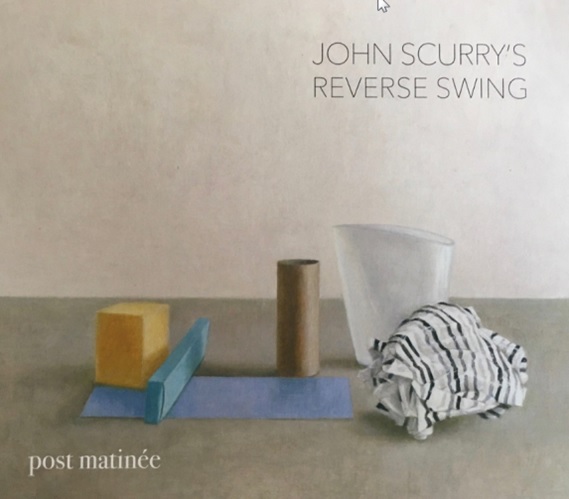 | John Scurry's Reverse Swing - Post Matinée (LSR20175)
|
This new release comprises of freshly minted original songs from the Australian guitarist John Scurr a stalwart of the Swing and Trad jazz scene in for over five decades.John is also a renowned visual artist and teacher and has performed at most major jazz festivals throughout Australia and Europe as a musician and his paintings have been exhibited at major galleries in Victoria and New South Wales - including the superb cover image of this CD.Throughout this recording his compositions allow his musical colleagues an opportunity to shine and improvise and that they do with style and panache.Melbourne based vocalist Shelly Scown appears on four tracks as does National Jazz Award winner James Macaulay playing trombone on several of the other.There’s also some fun and dexterous trumpet playing from Eugene Ball alongside the accomplished guitar of Scurry and Matt Boden’s gleefully played piano. Howard Cairns is marvellous on the double bass and English concertina and the clarinet of Michael McQuaid and saxophone of Phil Noy are a joy to hear. They’re all driven along by the exemplary percussion and drums of Danny Fischer.It’s a fun album that creates an instant party atmosphere of nostalgic style jazz but with all new compositions that you can dance to or just enjoy in the background as rich memories from less hectic days
   
|
Barry O’Sullivan
|
| Back to Index |
|
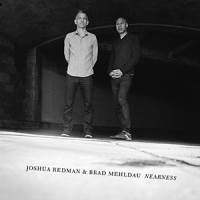 | Joshua Redman and Brad Mehldau - Nearness (Nonesuch Records 7559-79456-0 )
|
Released to coincide with their world tour of 2016 and their performances at various venues in Australia, this perfect musical pairing of two of the most prominent and highly respected improvising virtuoso performers in Jazz today, is in fact their first duo recording. Brad Mehldau first came to prominence as a member Joshua Redman's quartet in the 1990s before becoming a bandleader himself. The pair reunited in 2010 when Redman was featured on Mehldau's album Highway Rider. In 2013, Mehldau was featured as a performer and producer on Redman's recording Walking Shadows.Nearness features live performances captured during a previous 2011 European tour, comprising of three original tracks and three familiar jazz standards. There is a meticulousness to the continuous process of abstraction that Mehldau applies to a tune with a certain density of information. This can be followed by a stripped down emotionally direct interpretation of a ballad that comes from nowhere and knocks the wind out of you with its simplicity and clarity. Highlights of the recording are a sixteen minute rendition of Hoagy Carmichael’s The Nearness of You which displays Mehldau’s harmonic skills with a particularly skilful unaccompanied break from Redman on tenor sax. Another highlight is their interpretation of the Mehldau composition Old West with Redman’s dexterity and lyricism on soprano saxophone a sheer joy to listen to. On all of the tracks there are musically intelligent conversations between two stellar artists with Redman chasing the tune while Mehldau deconstructs the harmony and rhythm. As performers their virtuosity is unparalleled and highly recommended listening.
    
|
Barry O’Sullivan
|
| Back to Index |
|
| Archives 2017 |
| Archives 2016 |
| Archives 2015 |
| Archives 2014 |
| Archives 2013 |
| Archives 2012 |
| Archives 2011 |
| Archives 2002-2010 |
























